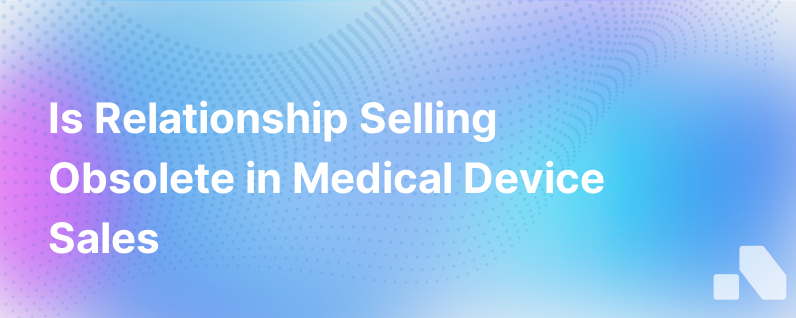Is Relationship Selling Dying In Medical Devices
Published on September 5, 2023 by Sawyer Middeleer
In an industry as people-centric and reliance-driven as medical devices, the concept of relationship selling has been the bedrock of sales strategies for decades. The personal rapport that sales representatives have traditionally cultivated with healthcare providers has been considered a critical driver of business success. However, with the digital revolution and changing healthcare dynamics, some observers are questioning the continued viability of this approach.
In examining whether relationship selling is dying in the medical devices industry, it is important to understand the transformations taking place within the healthcare sector, the evolving nature of purchasing decisions, and the emergence of new technology platforms that are reshaping how medical device companies engage with healthcare professionals (HCPs).
The Traditional Role of Relationship Selling in Medical Devices
Historically, the medical devices field has hinged on the strength of personal relationships between sales reps and HCPs. Sales reps served not only as vendors but as consultants, trainers, and in some cases, as part of the surgery team, providing on-the-spot technical support. These relationships were built over years, creating a high degree of loyalty and trust, often giving sales reps insight into the nuanced needs of the HCPs, thus enabling them to offer personalized, value-added services.
Shifting Dynamics in Healthcare Purchasing
Several key dynamics are transforming how purchasing decisions are made in healthcare, and in turn, impacting the traditional relationship selling model:
-
Centralized Purchasing: There has been a significant shift towards centralized purchasing decisions through Group Purchasing Organizations (GPOs) and Integrated Delivery Networks (IDNs). This reduces the individual influence of HCPs and shifts negotiation power towards pricing and standardized purchasing terms.
-
Increased Scrutiny and Regulation: Stringent regulations regarding relationships between HCPs and sales reps, such as the Sunshine Act in the United States, have introduced transparency requirements that dampen the traditional wine-and-dine approach some reps used to build relationships.
-
The Shift to Value-Based Care: Healthcare systems are increasingly focusing on outcomes rather than procedures. Medical device sales teams now need to demonstrate economic and clinical value, making in-depth product knowledge and data-driven selling points more important than personal relationships.
-
The Rise of Digital Engagement: Advances in technology mean that HCPs can access vast amounts of information online. This self-service approach to research has made some aspects of the traditional sales rep role redundant.
Is Relationship Selling Being Phased Out?
Given these shifts, it's clear that relationship selling in its classic form is under pressure. Here's why:
-
Influence is Diluting: As decision-making becomes more collective and data-focused, the one-to-one influence that sales reps had is waning. While relationships still matter, they no longer guarantee sales success.
-
Increased Need for Evidence: HCPs and procurement bodies are demanding quantifiable evidence of the value and efficacy of medical devices. Without robust data and a strong value proposition, a good relationship might not be enough.
-
Digital Tools Are Redefining Interactions: With virtual meetings, augmented reality demos, and digital communication pathways, physical presence has become less essential. This does not signal the death of relationships but rather the transformation of how these relationships are maintained and nurtured.
A Bridge Between Old and New: The Evolution of Relationship Selling
Despite these trends, relationship selling is evolving rather than dying. The medical devices sales force can leverage new technology while still maintaining the core components of relationship selling through:
-
Value-Based Relationships: Building relationships on the foundation of value brings robustness to HCP engagements. Sales reps are now seen as partners who help HCPs navigate toward solutions with the best patient outcomes and economic rationale.
-
Adoption of Technology: Sales teams can use CRM systems, mobile sales enablement platforms, and AI-driven analytics to improve customer insights, tailor engagements, and manage relationships more effectively.
-
Providing Education and Support: Sales reps are transitioning into roles that provide more educational content and online support. They are adapting to be resources that HCPs can rely on for up-to-date clinical and product information.
-
Omni-channel Engagement: By embracing an omni-channel approach, sales reps can complement face-to-face interactions with virtual ones, ensuring they are providing value to HCPs through every available channel.
Conclusion
While the face may be changing, the heart of relationship selling remains critical in the medical devices industry. Sales reps who can adeptly utilize data, technology, and their personal insight will continue to add value to HCPs in ways that influence purchasing decisions and build alliances. Relationships will always be essential to sales, but the strategies to establish and maintain them must evolve alongside the industry's shifting landscape.
The key takeaway is that relationship selling is not dying; it is transforming. There is a premium on adaptability, understanding, and utilizing new methods to maintain and establish connections while always providing value. In a future where technology blends with tradition, the medical device sales reps who embrace this evolution will thrive.